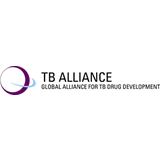
TB Alliance (formerly known as The Global Alliance for TB Drug Development) is a not-for-profit, product development partnership accelerating the discovery and development of new tuberculosis (TB) drugs that will shorten treatment, be effective against susceptible and resistant strains, be compatible with antiretroviral therapies for those HIV-TB patients currently on such therapies, and improve treatment of latent infection.
TB is a contagious disease of global proportions, killing someone every twenty seconds. Today's TB drugs are more than 40 years old and must be taken for at least 6 months. Long, demanding treatment schedules prove too much for many patients, and the resulting erratic or inconsistent treatment breeds drug resistance. New drugs are desperately needed to save millions of lives needlessly lost to TB. Mounting resistance to today's drugs, including multi and extensively drug-resistant TB (MDR-TB and XDR-TB), coupled with a growing number of patients co-infected with TB and HIV, are making the pandemic more threatening and more deadly.
Working with public and private research laboratories worldwide, the TB Alliance is leading the advancement of the most comprehensive portfolio of TB drug candidates in history. The TB Alliance merges the best practices of the public and private sectors to meet this critical, global health need. As the leading developer of new TB drugs, we catalyze and convene — bringing together the top minds of science and business to achieve our goals. Our value proposition and bottom line come down, simply, to the millions of tuberculosis patients worldwide who need us to succeed.
The TB Alliance is committed to ensuring that approved new regimens are affordable, adopted and available to those who need them. Recognizing that new, faster and better TB drugs will only be effective if they are affordable and available, the TB Alliance and its partners are working with global, regional, and national stakeholders to ensure regulatory approval, adoption by TB programs, and widespread availability of new drug regimens.
The TB Alliance is also committed to supporting the development of Community Engagement (CE) strategies for clinical trials to serve as a bridge between trial researchers and local TB affected communities. Community Engagement strategies help to ensure that study participants, their families, community stakeholders, and others who may be affected by or at risk of TB infection, have an opportunity to partner with the scientific community in the implementation of research efforts. Community Engagement strategies can provide mechanisms for:
• educating communities about TB disease, treatment and the research process such as the different phases, the regulatory process, and in-built systems to ensure ethical conduct;
• obtaining community input into clinical trial implementation;
• understanding community perceptions and experiences, and identify community concerns so that they are addressed in the research process;
• liaising with community leaders to facilitate smooth implementation of clinical programs;
• sharing and discuss clinical trial and research results; and
• motivating communities to assist with policy and regimen change


